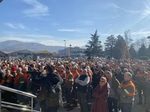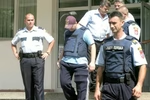Brammertz: Regional judicial cooperation remains significant issue

Regional judicial cooperation remains significant issue, UN court's chief prosecutor Serge Brammertz said addressing the UN Security Council on Tuesday, commending the instances of cooperation between Bosnia and Herzegovina and Serbia, but not Croatia.
Oglas
In Bosnia and Herzegovina, Croatia and Serbia, there are still more than three thousand suspected perpetrators of war crimes, crimes against humanity and genocide to be investigated and prosecuted. My Office’s assistance is essential to completing this work. Our evidence collection contains more than eleven million pages of testimony, reports and records that national prosecutors need. Our staff have expert knowledge of the crimes and the perpetrators,” said Brammertz, presenting the report on work of the Office of the Prosecutor of the International Residual Mechanism for Criminal Tribunals.
In the part of his report referring to the former Yugoslav countries, Brammertz paid particular attention to the judicial cooperation, which he called the significant issue. While he commended Bosnia and Herzegovina and Serbia in that, he addressed criticism towards the Croatian authorities.
Recently, my Office has facilitated a number of positive developments between Bosnia and Herzegovina and Serbia. The respective chief prosecutors continue to exchange evidence and case files to ensure greater accountability. Unfortunately, both countries are experiencing severe difficulties obtaining cooperation from Croatia. As my written report details, the Croatian Government is taking political decisions to block the justice process. For example, prosecutors in Bosnia and Herzegovina are waiting for cooperation in more than eighty cases, some of which have been pending for seven years,” he has warned.
The prosecutor recalled that a decade ago, Croatia was at the forefront of efforts to improve regional judicial cooperation in war crimes cases, but that today there is a “widespread impression that in Croatia there is the will to pursue justice for Croatian victims but not for victims of other ethnicities.”
He urged the countries of the former Yugoslavia to put their political differences aside and significantly increase their cooperation in the search for missing persons.
“This is a humanitarian imperative,” he udnerlined.
Kakvo je tvoje mišljenje o ovome?
Učestvuj u diskusiji ili pročitaj komentare
Oglas
Kakvo je tvoje mišljenje o ovome?
Učestvuj u diskusiji ili pročitaj komentare
Oglas





 Srbija
Srbija
 Hrvatska
Hrvatska
 Slovenija
Slovenija



























































